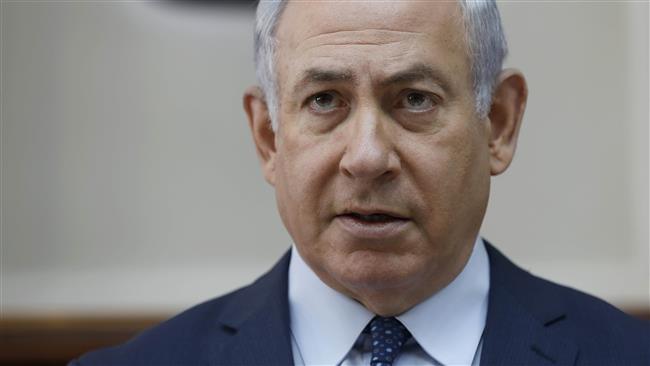
RNA - “If he fires at us, we will destroy his forces,” Netanyahu said at an event organized by the Policy Exchange think tank during a visit to London on Thursday, adding that Damascus had to “understand” that Tel Aviv would not tolerate what it called “the Iranian military entrenchment” against the Israeli regime inside the Arab country.
“The consequences are not merely to the Iranian forces there but to the Assad regime as well …, I think it's something that he should consider very seriously,” the Israeli premier further said.
Israel has repeatedly claimed that Iran has set up purported military bases and infrastructure in southern Syria for attacks against the occupying regime.
However, Iran has time and again stressed that it has no such bases in the Arab country and that its assistance to the militancy-infested Syria has so far been through offering military advisory support to the Syrian army at the official request of the Damascus government and in an attempt to enable the country’s troops to speed up their gains on various fronts against terror outfits.
Netanyahu’s Thursday comments actually echoed his previous allegations late last month when he threatened that Tel Aviv would hit what it called Iranian targets “anywhere in Syria.”
In the early hours of May 10, Israel attacked dozens of targets inside Syria in what was said to be the most extensive strike in the Arab country in decades.
The Tel Aviv regime claimed that its assault was a response to a barrage of 20 rockets that were fired from Syria at Israeli military outposts in the occupied Golan Heights. It also blamed the rocket fire on Iran.
According to Press TV, over the past few years, Israel has frequently attacked military targets in Syria in what is considered an attempt to prop up terrorist groups that have been suffering heavy defeats against Syrian government forces. But only in April 2016, Netanyahu officially admitted for the first time that the regime's military had conducted strikes in the Syrian territory.
In September 2016, Israeli legislator Akram Hasoon accused the Tel Aviv regime of directly providing military assistance to members of the Jabhat Fateh al-Sham Takfiri terrorist group, formerly known as al-Nusra Front, in the Israeli-occupied Golan Heights, saying that terrorists were shelling the Druze village of Khadr under the generous support and protection of Israel’s minister of military affairs Avigdor Lieberman.
He also disclosed that Israel had offered advanced technological equipment to Jabhat Fateh al-Sham militants in order to give them the upper hand in clashes with Syrian government forces.
Israel seized the Golan Heights from Syria during the 1967 Six-Day War and has continued to occupy two-thirds of the strategically-important territory ever since, in a move that has never been recognized by the international community.
847/940